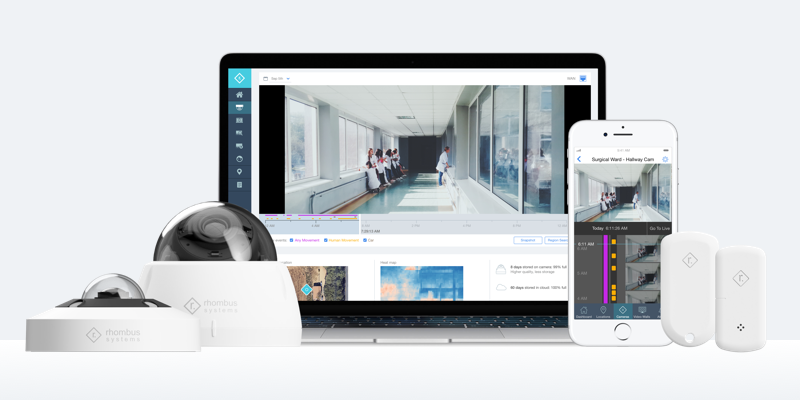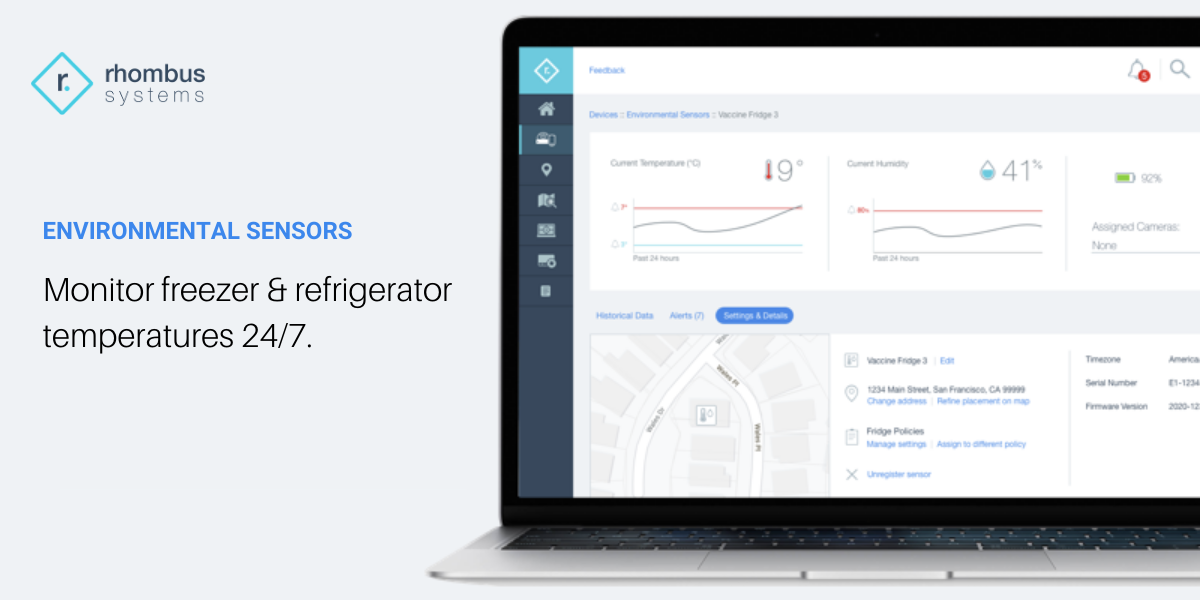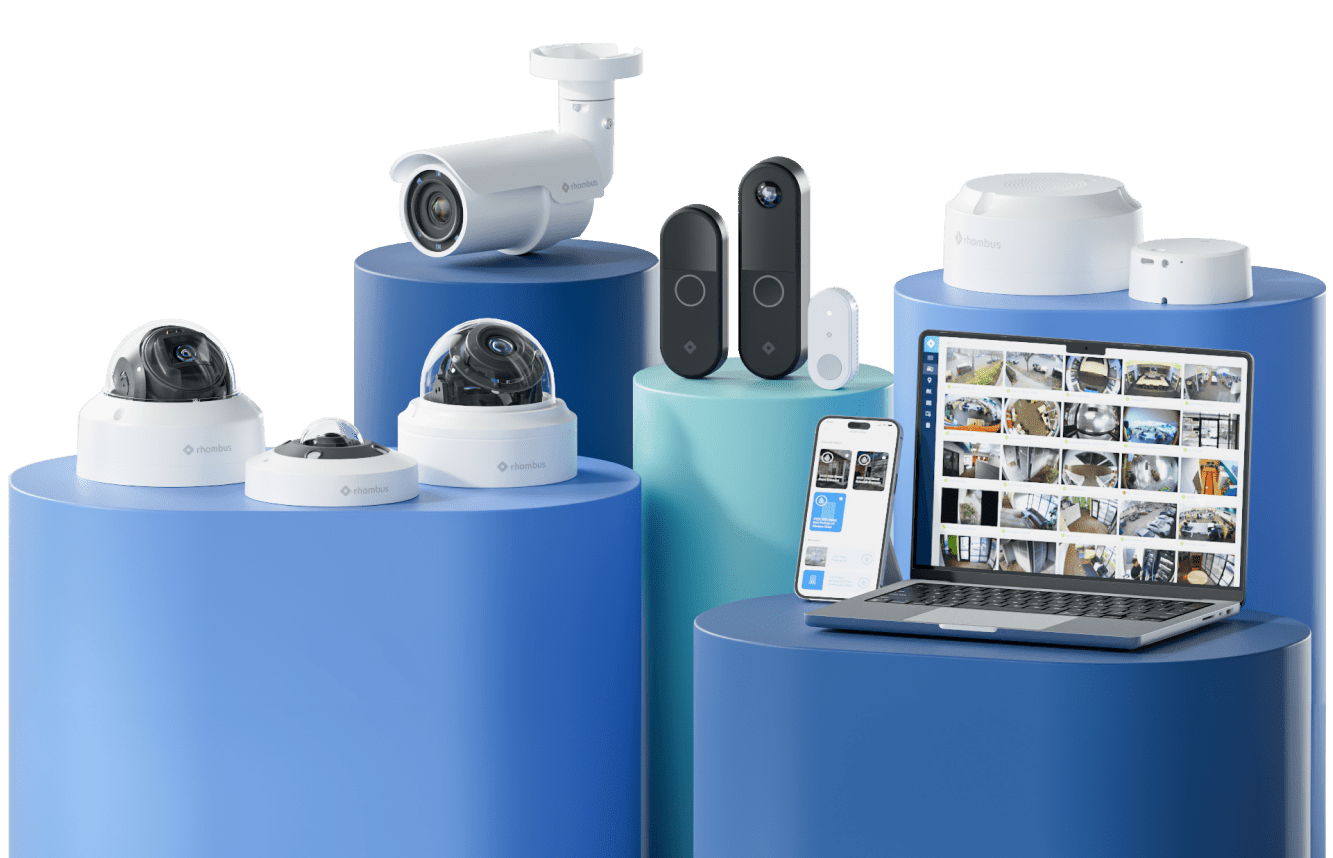
Improving COVID-19 Response: Vaccine Storage and Security
February 24, 2021

COVID-19 vaccines are finally here, and healthcare providers are encountering new challenges around vaccine storage and security.
In this crucial next phase of distribution, hospitals and healthcare facilities must keep vaccines temperature-regulated and physically secure. With reports of people sabotaging COVID-19 vaccine supplies, it’s critical to find ways to safely store vaccines and protect hospital facilities.
In this post, we’ll discuss how hospitals and healthcare organizations can leverage Rhombus’ environment monitoring, access control integrations, and intelligent video security platform to improve security and operations.
For a comprehensive look at how to return to work more safely, read COVID-19 Return to Work: How to Make Your Workplace Safer with Smart Physical Security Tools.
Achieving Complete Hospital Visibility
Vaccine storage is part of a larger picture: comprehensive hospital security. Rhombus’ cloud-based video security platform includes multiple features that streamline security operations and are essential to properly monitoring healthcare environments now and in the future.
These features include:
- 24/7 remote access from anywhere: Remote access is a huge timesaver—you can access footage and problem-solve from anywhere, not just on site. With Rhombus' native remote access, you can quickly access the footage you need from any web browser or mobile device. Additionally, you can manage all locations and cameras from one unified console —no juggling logins or locations.
- Real-time video alerts with AI analytics: Automated alerts are highly valuable in a healthcare environment because they enable you to respond to potential emergencies much more quickly. With Rhombus’ real-time video alerts, you can receive immediate intel about urgent situations straight to your device.
- Smart cameras + sensors + integrations: The Rhombus platform simplifies video security by leveraging a seamless network of best-in-class technology. By combining smart video surveillance, IoT sensors, and flexible integrations, healthcare facilities can increase visibility and unify security operations from one secure platform.

Securing COVID-19 Vaccines
Leveraging an intelligent video security solution like Rhombus can help keep vaccine storage secure in multiple ways. With smart cameras and IoT sensors, hospital administrators can secure restricted areas and receive a comprehensive picture of what’s going on at all times.
Securing Entryways with Video Security and Access Control
One of the simplest ways to prevent unexpected activity around vaccine storage is by securing entryways. Rhombus offers open integrations with leading access control solutions, such as Openpath and Kisi, that pair seamlessly with Rhombus smart cameras.
This integration allows you to detect and receive real-time video alerts for unauthorized entry and set permissions so that only authorized individuals can access COVID-19 vaccines.
Protecting COVID-19 Vaccines with IoT Sensors
With the Rhombus IoT sensors, hospitals can gain granular and powerful insights that make vaccine storage incredibly easy. The Rhombus sensors connect automatically to the smart cameras to provide real-time sensor data. When a sensor is triggered, a video alert with corresponding video evidence of what caused the alert will be included, allowing you to respond immediately to the situation.
Sensors are perfect additions when you need greater contextual data that cameras can’t provide. The Rhombus sensors are small, wireless, and can be deployed virtually anywhere.
To protect COVID-19 vaccines, each Rhombus sensor accomplishes a specific task for a complete view of your storage environment:
- Asset Tags track the location and movement of vaccine trays/cases. Within the Rhombus Console, you can monitor where the vaccine trays are located and receive alerts when there is unexpected movement or if a tray goes missing.
- Door Sensors can be applied to fridge or freezer doors to ensure they are properly closed so that the temperature stays stable. They can also trigger an alert if they are accessed outside of normal hours.
- Environmental Sensors monitor the temperature in the fridge or freezer and can issue proactive alerts when the temperature is abnormal to prevent vaccine spoilage.

Maintaining Vaccine Storage Conditions
The COVID-19 vaccines must be stored at specific temperature ranges. The Pfizer vaccine can be in refrigerated units at temperatures between 2° C and 8° C for up to 5 days. The Moderna vaccine is stored between -25° C and -15° C (-13° F and 5° F). Proper storage is critical; if the vaccines thaw outside of these temperature ranges, they spoil and must be thrown away.
With Environmental Sensors, you can monitor freezer and refrigerator temperatures 24/7. You can set custom temperature ranges and receive alerts if the temperature exceeds those parameters.
For example, a vaccine storage unit should operate at 5°C. If you set an environmental alert threshold at between 3° C and 7° C (or another temperature), you’ll receive an automated alert if the temperature falls outside of this range, so that you can intervene and save the vaccines from spoiling.

For even greater functionality, Rhombus offers an open API to enable custom functionality and automation. For example, organizations can create an integration that adjusts the temperature as needed when the environmental sensor is triggered. The Rhombus API is built around openness and delivers unrivaled flexibility so that you can build a solution that meets your needs entirely.
Remaining HIPAA Compliant
Security cameras have access to private and privileged information—even more so in healthcare. You need to have full trust that your data is always secure and all systems follow required regulations, including HIPAA compliance.
Rhombus is fully HIPAA Compliant and uses best-in-class cybersecurity practices to protect all data. We’ve worked with numerous healthcare organizations to ensure HIPAA compliance and if you would like to learn more about how Rhombus can help your healthcare organization be more secure, contact sales@rhombussystems.com.

Conclusion
Efficient vaccine distribution is crucial to slowing the spread of COVID-19 and saving lives. With scalable, easy-to-use, AI-powered smart cameras and IoT sensors, Rhombus can improve vaccine storage and security and improve operations for healthcare facilities as a whole.
Ask us how Rhombus can aid your vaccine distribution strategy—schedule a demo or a free trial.
Learn more about cloud video security and HIPAA Compliance: What You Need to Know – HIPAA Compliance and Video Security

Try Rhombus for Free!
See why school districts, cities, and Fortune 500 companies use Rhombus.
Start Trial

